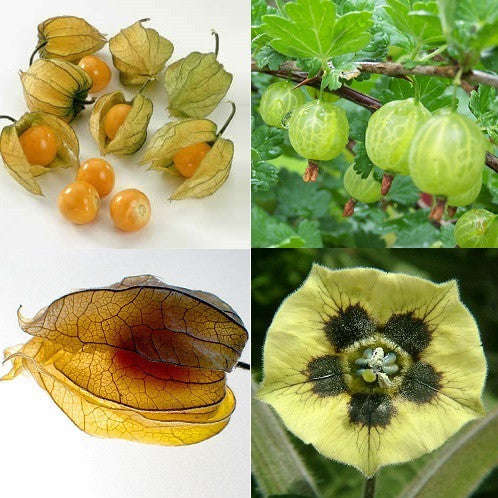
Cape Gooseberry - Bulk Fruit / Berry Seeds - 1 000 Seeds
Check my rate
View locations
| Main centres: | 1-3 business days |
| Regional areas: | 3-4 business days |
| Remote areas: | 3-5 business days |

| Main centres: | 1-3 business days |
| Regional areas: | 3-4 business days |
| Remote areas: | 3-5 business days |
| Variety - Cape Gooseberry Scientific name - Physalis peruviana Approximate seeds per gram - N/A Pack Size - 1 000 seeds Description - Physalis peruviana is the plant and its fruit, also known as Cape gooseberry (South Africa), Inca berry, Aztec berry, golden berry, giant ground cherry, Peruvian groundcherry and sometimes simply Physalis. It is indigenous to South America, but has been cultivated in England since the late 18th century and in South Africa in the region of the Cape of Good Hope since at least the start of the 19th century. Physalis peruviana is closely related to the tomatillo, also a member of the genus Physalis. As a member of the plant family Solanaceae, it is more distantly related to a large number of edible plants, including tomato, eggplant, potato and other members of the nightshades. Despite its name, it is not closely related to any of the cherry, Ribes gooseberry, Indian gooseberry, or Chinese gooseberry. The fruit is a smooth berry, resembling a miniature, spherical, yellow tomato. Removed from its bladder-like calyx, it is about the size of a marble, about 12 cm in diameter. Like a tomato, it contains numerous small seeds. It is bright yellow to orange in colour, and it is sweet when ripe, with a characteristic, mildly tart flavour, making it ideal for snacks, pies, or jams. It is relished in salads and fruit salads, sometimes combined with avocado. Also, because of the fruit's decorative appearance, it is popular in restaurants as an exotic garnish for desserts. A prominent feature is the inflated, papery calyx enclosing each berry. The calyx is accrescent until the fruit is fully grown; at first it is of normal size, but after the petals fall it continues to grow until it forms a protective cover around the growing fruit. If the fruit is left inside the intact calyx husks, its shelf life at room temperature is about 3045 days. According to analyses by the USDA, a 100 g serving of Cape gooseberries is low in calories and contains modest levels of vitamin A, vitamin C, vitamin B1 and vitamin B3, while other nutrients are at low levels. Basic research on the cape gooseberry has provided preliminary evidence that its constituents, possibly polyphenols and/or carotenoids, may have anti-inflammatory and antioxidant properties. The crude extract of the fruit-bearing plant has in vitro evidence for activity against markers of inflammation and lung cancer. It has also shown possible properties in vitro against diabetes and hypertension mechanisms. Some withanolides isolated from the plant may have anticancer activity. In folk medicine, Physalis peruviana is thought to be a medicinal herb to treat diseases, none of which has been confirmed in human clinical trials as treatable by Cape gooseberry or its extracts. In South Africa, cutworms are the most important of the many insect pests that attack the Cape gooseberry in seedbeds; red spiders after plants have been established in the field; and the potato tuber moth if the Cape gooseberry is in the vicinity of potato fields. Birds eat the fruits if not repelled. In South Africa, the most troublesome diseases are powdery mildew and soft brown scale. The plants are prone to root rots and viruses if on poorly drained soil or if carried over to a second year.
Need a bigger sized pack? Contact us specifying the quantity and variety of seed you are looking for and we'll get right back to you! |